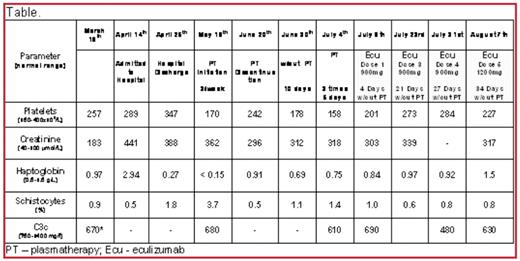Abstract
Atypical hemolytic uremic syndrome (aHUS) is a rare microangiopathic hemolytic anemia characterized by chronic intravascular hemolysis, consumptive thrombocytopenia, microvascular glomerular thrombosis and acute renal failure. Atypical HUS develops as the result of unregulated complement activation either through genetic abnormalities in one or more complement proteins or more rarely the development of autoantibodies to complement factor H. Complement dysregulation has been shown to cause cause subendothelium exposure and activation of platelets resulting in a chronic proinflammatory and prothrombotic state. The prognosis for aHUS is poor as 25% of patients die during acute phases of the disease and 50% progress to end-stage-renal disease. In addition, the majority of renal transplants result in loss of the graft. Plasmatherapy (PT), either plasmapheresis, plasma infusion, or both, is currently used in an attempt to control complement activation and thereby reduce the thrombotic microangiopathy (TMA) and declining renal function, but this therapy is cumbersome and not effective in all patients. Eculizumab, an antibody targeting complement C5, blocks activation of terminal complement and generation of the proinflammatory and prothrombotic molecules C5a and C5b-9. In previous studies eculizumab significantly blocked complement-mediated hemolysis in patients with paroxysmal nocturnal hemoglobinuria, subsequently reducing thrombotic events and improving renal function. In this study, we report the first case of eculizumab treatment in a patient with recurrent aHUS after renal transplantation who refused further PT. The patient is a 42-year-old female diagnosed with a familial form of aHUS with a C3 mutation leading to a binding defect between C3b and the complement control molecules factor H and membrane cofactor protein. The patient showed reduced serum levels of C3c (670 mg/L) suggesting C3 consumption. The patient had received 2 previous renal transplants, the last of which was performed in 2004; aHUS recurred after each transplant and required PT. In March 2007 the patient experienced an acute episode of aHUS and received 2 intensive PT sessions (60 treatments over 9 mos) to resolve the recurrence. In April 2008, the patient presented with septicemia and acute renal failure and was hospitalized for 10 days. In May 2008 her platelet count dropped to 170 ×109/L, haptoglobin became undetectable (< 0.15 g/L), and schistocytes increased to 3.7% suggesting an acute TMA exacerbation, confirmed by renal biopsy. Plasmatherapy was initiated with a course of high dose steroids and IV immunoglobulins. The administration of frequent PT treatments (16 treatments over 5 weeks) resulted in an improvement in the ongoing TMA. However, despite intensive PT, the patient continued to suffer from severe fatigue and daily episodes of diarrhea and chose to discontinue this therapy. As a result, disease deterioration was observed (see 10 Days of No PT in Table). The clinical deterioration established the need for an alternative treatment to reduce TMA and stabilize renal function. PT (3 treatments) was performed as a bridging treatment to eculizumab. Treatment with eculizumab was initiated 4 days following the last PT. The patient received a meningococcal vaccine 4 days prior to treatment with eculizumab and then prophylactic antibiotics (ciprofloxacin) after the vaccination. The patient received 4 doses of eculizumab, 900 mg IV approximately every 7 days, and then 1200 mg 7 days later, and is scheduled to receive chronic dosing at 1200 mg every 14 days. Platelet count, hemolysis and renal function were monitored. After one month of eculizumab treatment, and without concomitant PT, platelet count increased (range from 227 to 284 ×109/L), schistocytes decreased to 0.8% and haptoglobin increased to within normal limits (1.5 g/L; see “Ecu Dose 5”). Levels of C3c fluctuated between 420 and 690 mg/L, creatinine levels were stable and no further episodes of diarrhea were reported. In summary, the data suggest that chronic blockade of complement C5 with eculizumab maintained renal function and reduced platelet consumption and hemolysis without PT in a patient with aHUS previously dependent on frequent PT. Based on these results clinical trials are warranted to confirm the activity of eculizumab for the treatment of patients with recurrent aHUS that are dependent on PT.
Disclosures: No relevant conflicts of interest to declare.
Author notes
Corresponding author


This feature is available to Subscribers Only
Sign In or Create an Account Close Modal